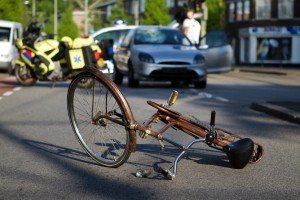On Thursday, July 17, 2014, cyclist Phillip “Geric” Geeck’s life ended abruptly and tragically when he was struck by a tractor-trailer at the intersection of St. Claude and Elysian Fields in New Orleans. The truck was traveling on St. Claude Avenue toward the French Quarter and turned right onto Elysian Fields when Geeck was struck. Responding NOPD officers did not issue the driver a traffic citation nor did they make an arrest at the crash site.

Unfortunately, bicycle accidents identical to the event described above occur much too often in New Orleans. How can cyclists and drivers prevent these tragedies from happening? We can start by familiarizing ourselves with the Louisiana bicycle laws. Most rules of the road for cyclists and drivers are found in the Louisiana Motor Vehicle and Traffic Code, Title 32. Below is an overview of the laws included in Title 32:
1. Helmet Laws: R.S. 32:199
Helmets are required for riders under the age of 12 years old. While head protection is not required for riders above the age of 12, wearing a helmet is generally a good idea for all. The law further states that the issuance of a citation for failure to wear a required helmet shall not be prima facie evidence of negligence. The comparative negligence statutes of Louisiana shall apply in these cases as in all other cases of negligence.
2. Safe Passing Laws: R.S. 32:76.1
When passing a cyclist traveling in the same direction on a roadway, an operator of a motor vehicle shall exercise due care while the motor vehicle is passing the bicycle and shall leave a safe distance between the motor vehicle and the bicycle of at least three feet.
3. Keeping Bike Lanes Clear: R.S. 32:203
Drivers should avoid entering bike lanes. In the event that a driver must enter a bike lane, the driver must yield to cyclists.
4. Door Law: R.S. 32:283
Drivers must take precaution before opening a car door on a Louisiana highway to ensure that they are not interfering with traffic, a cyclist, or another driver.
5. Riding in the Direction of Traffic: R.S. 32:197
Bicyclists must ride as close as practicable to the right-hand side of the roadway except under any of the following circumstances: (1) when overtaking and passing another bicycle or vehicle proceeding in the same direction; (2) when preparing for a left turn at an intersection or into a private road or driveway; (3) when reasonably necessary to avoid conditions that make it unsafe to continue along the right-hand curb or edge of the roadway, including a lane that is too narrow for a bicycle and a vehicle to travel safely side by side within the lane; (4) when approaching a place where a right turn is authorized; and (5) when operating upon a roadway or a highway, where there are two or more marked traffic lanes and traffic travels in only one direction, in which case a bicyclist may ride as near the left-hand curb or shoulder of that roadway as practicable when preparing for a left turn.
6. Hand Signals and Riding Gear: R.S. 32:106 and R.S. 32.329.1
Cyclists must use hand signals when turning and stopping and must use bike lights and reflectors at night.
7. Checking your Brakes: R.S. 32:346
Every bicycle shall be equipped with a brake which will enable the operator to make the braked wheels skid on dry, level, clean pavement.
8. Traffic Signals and Signs: R.S. 32:232 and R.S. 32:123
Cyclists must obey traffic signals and come to a complete stop at stop signs.
Been Injured in a Bicycle Accident?
The above laws are just a few examples of regulations included in Title 32. Additional rules can be found in Parish and/or Municipal Codes. The purpose of these regulations is to keep cyclists and drivers safe, but unfortunately, many serious bicycle accidents involve inattentive or distracted car and truck drivers. While Louisiana law provides that cyclists “have all the same rights and all the same duties” as motor vehicles upon the road, the reality is that cyclists are much more vulnerable than the “big rig” on a Louisiana highway. Accidents can happen when drivers fail to yield to cyclists, back out of driveways, open car or truck doors without due care, run stop signs or traffic lights, or drive under the influence of drugs and/or alcohol.
If you or a loved one has been hurt in a bicycle accident, you may be able to seek financial compensation for your losses. In order to hold an at-fault party accountable for your suffering, you will have to prove that the at-fault driver’s negligence was a contributing factor in the crash. If the driver was speeding, impaired, distracted, fatigued or otherwise careless, he or she can be held accountable for your losses. The bicycle accident lawyers at Lambert Zainey are experienced in these types of claims and will fight for maximum compensation for your injuries. Contact Lambert Zainey today toll free at 1-800-521-1750.
